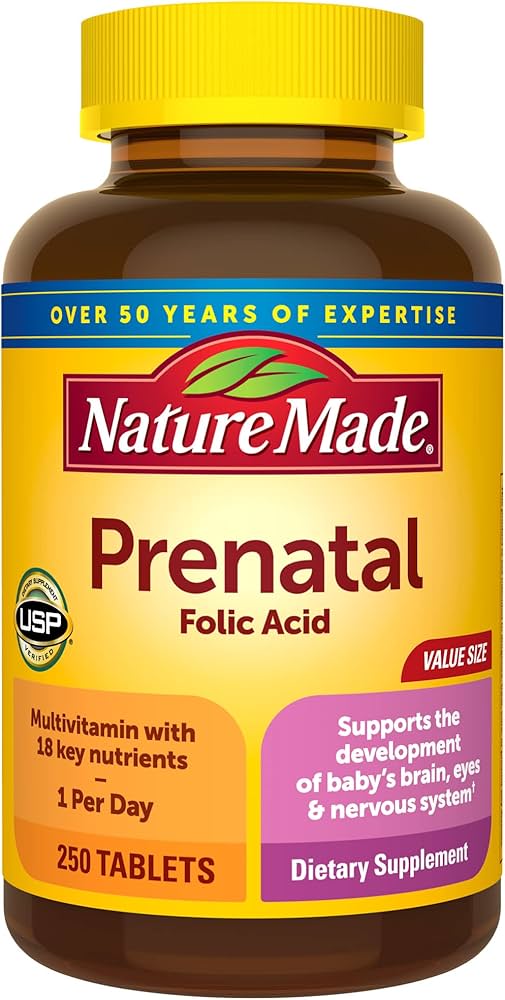Prenatal Vitamins Essentials are supplements designed to provide essential nutrients during pregnancy. They support fetal development and maternal health.
During pregnancy, a woman’s nutritional needs increase significantly. Prenatal vitamins help ensure that both the mother and baby receive vital nutrients. Key ingredients often include folic acid, iron, calcium, and DHA. Folic acid is crucial for preventing neural tube defects, while iron helps combat anemia.
Calcium supports the developing bones of the baby, and DHA contributes to brain development. Taking prenatal vitamins can help fill nutritional gaps and promote a healthy pregnancy. Expecting mothers should consult healthcare providers to choose the right prenatal vitamin tailored to their individual needs. Prioritizing nutrition during this critical time lays the foundation for a healthy future for both mother and child.

Credit: www.walmart.com
The Importance Of Prenatal Vitamins
Prenatal vitamins play a vital role during pregnancy. They ensure mothers get the essential nutrients. These nutrients support both the mother and baby’s health. Taking prenatal vitamins can lead to better pregnancy outcomes.
Key Nutrients For Pregnancy
Several key nutrients are crucial for a healthy pregnancy. Each nutrient serves a specific purpose. Here are some of the most important:
- Folic Acid: Prevents neural tube defects in the baby.
- Iron: Supports increased blood volume and prevents anemia.
- Calcium: Builds strong bones and teeth for the baby.
- DHA: Supports brain and eye development.
- Vitamin D: Aids in calcium absorption and immune function.
Stay Connected with Google News
Impact On Baby’s Development
Taking prenatal vitamins significantly impacts the baby’s development. Proper nutrient intake leads to healthy growth. Here’s how:
| Nutrient | Benefit for Baby |
|---|---|
| Folic Acid | Reduces risk of brain and spinal cord defects. |
| Iron | Supports healthy oxygen transport in the body. |
| Calcium | Essential for developing strong bones. |
| DHA | Critical for brain development. |
| Vitamin D | Supports immune health and bone strength. |
These nutrients work together to create a healthy environment for the baby. Expecting mothers should prioritize taking prenatal vitamins daily.

Credit: www.amazon.com
When To Start Taking Prenatal Vitamins
Choosing the right time to start taking prenatal vitamins is essential for a healthy pregnancy. These vitamins provide vital nutrients for both mom and baby. Knowing the right timing can help ensure optimal health during conception and beyond.
Timing Before Conception
Starting prenatal vitamins before conception is crucial. Experts recommend beginning them at least three months prior to trying to conceive. This allows your body to build up essential nutrients.
- Folic Acid: Reduces the risk of neural tube defects.
- Iron: Supports increased blood volume.
- Calcium: Helps develop the baby’s bones and teeth.
Here’s a simple table showing key vitamins to focus on:
| Vitamin | Benefit |
|---|---|
| Folic Acid | Prevents birth defects in the brain and spine. |
| Iron | Prevents anemia and supports the placenta. |
| Calcium | Builds strong bones for the baby. |
Continuing After Birth
After giving birth, continue taking prenatal vitamins. This helps with recovery and supports breastfeeding. Nutrients are still crucial for both mother and baby.
- Continue Folic Acid: Supports recovery and future pregnancies.
- Iron: Helps replenish lost blood.
- Omega-3 Fatty Acids: Supports brain development in breastfeeding babies.
Maintaining a nutrient-rich diet is also important. Focus on whole foods like fruits, vegetables, and lean proteins. These foods provide essential nutrients to enhance overall health.
Choosing The Right Prenatal Vitamins
Choosing the right prenatal vitamins is crucial for a healthy pregnancy. These vitamins support both mother and baby during this important time. With many options available, understanding what to look for can simplify the decision.
Ingredients To Look For
Not all prenatal vitamins are the same. Certain ingredients are essential for a healthy pregnancy. Here are key ingredients to consider:
- Folic Acid: Reduces the risk of neural tube defects.
- Iron: Supports increased blood volume and prevents anemia.
- Calcium: Builds strong bones and teeth for the baby.
- DHA: Supports brain and eye development.
- Vitamin D: Aids calcium absorption and bone health.
Understanding Different Forms
Prenatal vitamins come in various forms. Each form has its benefits. Here’s a quick overview:
| Form | Advantages | Disadvantages |
|---|---|---|
| Tablets | Easy to find and often cheaper. | Can be hard to swallow. |
| Softgels | Gentler on the stomach. | Often more expensive. |
| Gummies | Tasty and easy to consume. | May contain added sugars. |
| Powders | Mixes easily with drinks. | May require measuring. |
Choosing the right form depends on personal preference. Consider what works best for you.
Folic Acid: The Vital Component
Folic acid is crucial for pregnant women. It helps in the development of the baby. This vitamin plays a key role in preventing serious birth defects.
Folic acid is a type of B vitamin. It is important for making DNA and new cells. Pregnant women need more folic acid than usual.
Preventing Neural Tube Defects
Neural tube defects affect the brain and spine. These defects can occur early in pregnancy. Folic acid reduces the risk of these problems.
- Spina bifida: The spine does not close properly.
- Anencephaly: Parts of the brain are missing.
Studies show that taking folic acid can lower these risks. Women who take it before and during pregnancy help protect their babies.
Recommended Dosages
Doctors recommend a daily dose of folic acid. The usual amount is 400 to 800 micrograms (mcg).
| Stage | Recommended Dosage |
|---|---|
| Pre-Pregnancy | 400 mcg |
| During Pregnancy | 600 mcg |
| After Pregnancy | 500 mcg |
Some women may need more folic acid. This includes those with a history of neural tube defects. Always consult a healthcare provider for advice.
Iron’s Role In Prenatal Health
Iron is essential during pregnancy. It helps support your growing baby. Iron boosts the mother’s blood supply. This ensures oxygen reaches both mother and child. Adequate iron prevents fatigue and weakness.
Avoiding Anemia In Pregnancy
Anemia is common in pregnant women. It happens when iron levels drop too low. Symptoms include:
- Fatigue
- Pale skin
- Dizziness
- Shortness of breath
Iron helps form hemoglobin. Hemoglobin carries oxygen in the blood. A lack of hemoglobin can lead to anemia. Pregnant women need about 27 mg of iron daily. This is double the amount needed for non-pregnant women.
Foods rich in iron include:
| Food | Iron Content (mg) |
|---|---|
| Red meat | 2.1 – 3.0 |
| Poultry | 1.0 – 2.5 |
| Beans | 2.0 – 3.5 |
| Spinach | 2.7 |
| Fortified cereals | 4.5 – 18.0 |
Consuming vitamin C with iron-rich foods helps absorption. Pairing oranges, strawberries, or bell peppers with meals is beneficial.
Safe Iron Levels
Too much iron can be harmful. High doses lead to health issues. Pregnant women should not exceed 45 mg daily. Always consult a healthcare provider before taking supplements.
Signs of iron overload include:
- Nausea
- Abdominal pain
- Joint pain
Regular blood tests can check iron levels. Your doctor will guide you on the right dosage. Safe iron intake ensures a healthy pregnancy.
Calcium And Vitamin D For Bone Health
Calcium and Vitamin D are vital for strong bones. They support both mother and baby during pregnancy. Adequate intake of these nutrients can prevent complications. Strong bones are essential for a healthy pregnancy.
Requirements During Pregnancy
Pregnant women need more calcium and Vitamin D than usual. Here are the recommended daily amounts:
| Age Group | Calcium (mg) | Vitamin D (IU) |
|---|---|---|
| 19 years and older | 1,000 | 600 |
| Under 19 years | 1,300 | 600 |
These amounts help ensure proper bone development for the baby. They also support the mother’s health.
Sources And Supplements
Many foods provide calcium and Vitamin D. Include these in your diet:
- Dairy products: Milk, cheese, yogurt
- Leafy greens: Kale, broccoli, collard greens
- Fish: Salmon, mackerel, sardines
- Fortified foods: Orange juice, cereals, plant-based milk
Supplements can help meet daily needs. Choose a prenatal vitamin with calcium and Vitamin D. Always consult a healthcare provider before starting any supplement.
Omega-3 Fatty Acids For Brain Development
Omega-3 fatty acids play a vital role in brain development during pregnancy. These essential fats, particularly DHA and EPA, support the growth of the fetal brain. Expecting mothers should consider their intake of these nutrients for optimal brain health.
Dha And Epa Benefits
DHA (Docosahexaenoic Acid) and EPA (Eicosapentaenoic Acid) offer numerous benefits:
- DHA is crucial for brain cell formation.
- EPA helps reduce inflammation in the body.
- Both support cognitive function and memory.
- They may lower the risk of postpartum depression.
Studies show that higher levels of DHA in the mother’s diet lead to improved brain development in babies. Infants who receive adequate DHA may have better visual and cognitive skills.
Natural Sources And Supplementation
Natural sources of omega-3 fatty acids include:
| Food Source | Omega-3 Content (per 100g) |
|---|---|
| Salmon | 2,260 mg |
| Sardines | 2,205 mg |
| Chia Seeds | 17,550 mg |
| Walnuts | 9,080 mg |
These foods provide essential omega-3s. If dietary intake is low, consider omega-3 supplements. Fish oil or algal oil are popular options.
Consult a healthcare provider before starting any supplement. Proper dosage is important for safety and effectiveness.
Managing Prenatal Vitamin Side Effects
Prenatal vitamins are essential for a healthy pregnancy. Some women experience side effects. Managing these effects is crucial for comfort and health.
Common Issues And Solutions
Many women report side effects from prenatal vitamins. Here are some common issues and their solutions:
| Side Effect | Description | Solution |
|---|---|---|
| Nausea | Feeling sick after taking vitamins. | Take vitamins with food or switch brands. |
| Constipation | Difficulty in having bowel movements. | Increase fiber intake and drink more water. |
| Heartburn | Burning sensation in the chest. | Divide doses throughout the day and avoid spicy foods. |
| Metallic Taste | Unpleasant taste in the mouth. | Try flavored or chewable vitamins. |
When To Consult A Doctor
Some side effects may need medical attention. Consult a doctor if:
- Side effects are severe or persistent.
- You experience allergic reactions like rash or swelling.
- You cannot keep food or vitamins down.
- Your doctor advises changing your prenatal vitamin.
Regular check-ups ensure you and your baby stay healthy.
Diet And Prenatal Vitamins: Working Together
Diet and prenatal vitamins play a crucial role in a healthy pregnancy. They support the growth and development of your baby. Understanding how to balance both can enhance your overall nutrition. A well-rounded approach ensures you receive essential nutrients.
Balancing Supplements With Food
Combining prenatal vitamins with a nutritious diet is essential. Each offers unique benefits that support maternal and fetal health. Here are key nutrients to focus on:
| Nutrient | Food Sources | Prenatal Vitamin Role |
|---|---|---|
| Folic Acid | Leafy greens, beans, citrus fruits | Prevents neural tube defects |
| Iron | Red meat, spinach, lentils | Supports blood volume and oxygen |
| Calcium | Dairy products, almonds, broccoli | Builds baby’s bones and teeth |
| DHA | Fatty fish, walnuts, flaxseeds | Supports brain development |
Eating a variety of foods enhances the effects of prenatal vitamins. Aim for a colorful plate. Include fruits, vegetables, whole grains, and lean proteins. This variety ensures you receive all necessary nutrients.
Creating A Nutritional Plan
Designing a nutritional plan simplifies healthy eating. Follow these steps to create one:
- Assess Your Needs: Consult your doctor for personalized advice.
- Set Goals: Aim for balanced meals rich in nutrients.
- Plan Meals: Incorporate foods that complement your prenatal vitamins.
- Stay Hydrated: Drink plenty of water daily.
- Track Progress: Keep a food diary to monitor your intake.
Include healthy snacks between meals. Nuts, yogurt, and fruits are great options. They provide energy and essential nutrients. Remember to adjust your plan as your pregnancy progresses. Each trimester may have different nutritional needs.

Credit: www.walgreens.com
Navigating Prenatal Vitamins With Multiples
Expecting twins or triplets? Proper nutrition is vital. Prenatal vitamins play a crucial role in supporting the health of both mother and babies. Understanding how to adjust these vitamins is essential for a healthy pregnancy.
Adjusting Dosages For Twins Or Triplets
Pregnant with multiples? You may need higher doses of certain vitamins. Here’s a quick guide:
| Nutrient | Recommended Daily Amount for Singles | Recommended Daily Amount for Multiples |
|---|---|---|
| Folic Acid | 400 mcg | 600-800 mcg |
| Iron | 27 mg | 50 mg |
| Calcium | 1,000 mg | 1,200 mg |
| DHA | 200 mg | 300 mg |
Consult your doctor for personalized recommendations. Each pregnancy is unique.
Monitoring Nutrient Intake
Keep track of your nutrient intake. This helps ensure the health of you and your babies. Here are some tips:
- Use a food diary to log daily meals.
- Check labels on prenatal vitamins for nutrient content.
- Consider nutrient-rich foods like:
- Leafy greens
- Lean meats
- Nuts and seeds
- Dairy products
Regular check-ups with your healthcare provider are essential. They can help monitor your health and the babies’ growth.
The Role Of Prenatal Vitamins In High-risk Pregnancies
Prenatal vitamins play a crucial role in high-risk pregnancies. They help support both the mother and developing baby. Special nutritional needs arise in these situations. Proper supplementation can prevent complications and promote healthy development.
Addressing Special Nutritional Needs
High-risk pregnancies often require specific nutrients. Some essential vitamins and minerals include:
- Folic Acid: Reduces the risk of neural tube defects.
- Iron: Supports increased blood volume and prevents anemia.
- Calcium: Important for the baby’s bone development.
- Omega-3 Fatty Acids: Supports brain development.
These nutrients can be found in prenatal vitamins. Consult with a healthcare provider for personalized recommendations. They may suggest higher doses based on individual needs.
Collaborating With Healthcare Providers
Collaboration with healthcare providers ensures proper care during pregnancy. Regular check-ups help monitor the mother and baby’s health. Providers may recommend:
- Blood tests to check for deficiencies.
- Tailored vitamin regimens based on test results.
- Dietary adjustments for optimal nutrition.
Open communication with doctors is essential. Share any concerns about health or nutrition. This partnership helps ensure a safer pregnancy for both mother and baby.
Frequently Asked Questions
What Are Prenatal Vitamins?
Prenatal vitamins are supplements designed to support the nutritional needs of pregnant individuals and their developing babies.
Why Should I Take Prenatal Vitamins?
Taking prenatal vitamins helps ensure you get essential nutrients like folic acid and iron for a healthy pregnancy.
What Nutrients Are In Prenatal Vitamins?
Common nutrients include folic acid, iron, calcium, DHA, and vitamins A, C, D, E, and B-complex.
Can Prenatal Vitamins Improve Fertility?
Some studies suggest that certain nutrients in prenatal vitamins may support reproductive health and improve fertility.
How Early Should I Start Taking Them?
It’s recommended to begin taking prenatal vitamins at least three months before conception for optimal health benefits.
Are There Any Side Effects Of Prenatal Vitamins?
Side effects can include nausea, constipation, and stomach upset, but these vary by individual and specific formulas.
Can I Get Enough Nutrients From Food?
While a balanced diet is essential, prenatal vitamins can fill nutritional gaps and ensure adequate nutrient intake during pregnancy.
Do I Need A Prescription For Prenatal Vitamins?
Many prenatal vitamins are available over-the-counter, but consult your healthcare provider for personalized recommendations.
Conclusion
Choosing the right prenatal vitamins is essential for a healthy pregnancy. These supplements provide vital nutrients for both mother and baby. Always consult with a healthcare provider before starting any vitamin regimen. Prioritizing nutrition can lead to better outcomes for you and your little one.
Stay informed and make healthy choices.




